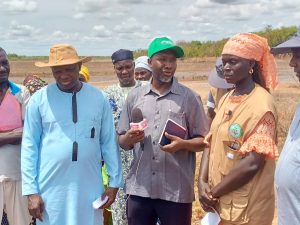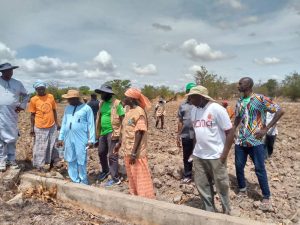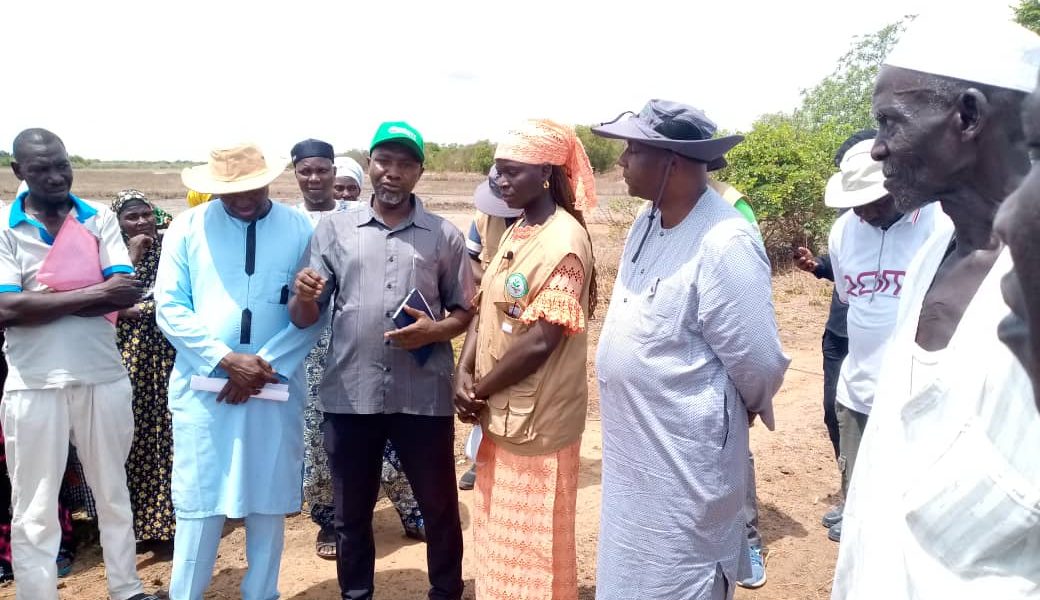The Honourable Minister of Agriculture, Dr. Demba Sabally, has embarked on a comprehensive three-day field visit from June 19th to 22nd to evaluate the readiness for the forthcoming rice growing season. This visit encompasses various rice production sites under the ROOTS project, other agricultural initiatives, and private sector contributions.
Day 1: Visiting Rice Production Sites in Foni Bintang District
Dr. Sabally began his tour at the Karanai village rice fields in the Foni Bintang District. Karanai benefits significantly from the ROOTS input support subsidy program. The community has been allocated 10 hectares for ploughing, of which 6 hectares have already been ploughed. The remaining area will be ploughed once the rains commence, allowing the tractor to continue its work. This support package includes essential fertilizers such as NPK and urea.
The team then visited Bajagarr, another community benefiting from the ROOTS Project’s subsidized Input Support Program. Here, the community has received 15 hectares of ploughing services, 150 bags of Sahel 134 rice seeds (each weighing 50kg), 60 bags of NPK, and 30 bags of urea. Additionally, they are scheduled to receive herbicides to aid in crop protection and growth.
Day 1 in LRR: Acknowledging Community Efforts and Support
The field visit continued in the Lower River Region (LRR), starting at Genieri in Kiang East. The village alkalo (chief), elders, and women expressed their deep gratitude to the Honourable Minister for his visit and the extensive support provided by the ROOTS Project over the past two years. The local lady president highlighted the support, which includes ploughing services, fertilizers, certified seeds, and production practices knowledge through the Farmer Field School (FFS) initiative. The targeted area for ploughing here is 35 hectares, of which 34 hectares have already been completed. Additionally, 35 bags of Sahel 134 rice seeds have been delivered to the community.
The final visit of the day was to Darsilami in Jarra East, where the community has been allotted 30 hectares for ploughing. This target has been met, and the community has received 30 bags of Faroo 44 rice seeds, with more to follow.


Day 2: Continuing the Field Visit to CRRS
On the second day of his visit, Dr. Sabally and his team will proceed to the Central River Region South (CRRS). This day will focus on evaluating further rice production sites and engaging with local communities to ensure that all preparations for the rice growing season are on track.
Importance of the ROOTS Project and Community Engagement
The ROOTS Project plays a crucial role in boosting rice production in these regions by providing necessary agricultural inputs and support services. This initiative not only enhances food security but also empowers local communities by improving their farming practices and yields. The active involvement of community members, especially women, in these projects is pivotal. Their participation in decision-making and field activities ensures that the support provided meets the actual needs and preferences of the local population.
Anticipated Outcomes and Future Plans
The Honourable Minister’s field visit is expected to reinforce the commitment of the Ministry of Agriculture to support rural communities and agricultural projects. By closely monitoring the progress and addressing any challenges, the Ministry aims to ensure a successful and productive rice growing season. Future plans include expanding the scope of the ROOTS Project to cover more communities and introducing advanced farming techniques and technologies to further enhance productivity and sustainability.
Conclusion
Dr. Demba Sabally’s proactive approach through this field visit underscores the government’s dedication to agricultural development and food security. By supporting initiatives like the ROOTS Project and engaging directly with communities, the Ministry of Agriculture aims to create a resilient and prosperous agricultural sector that benefits all stakeholders involved.


